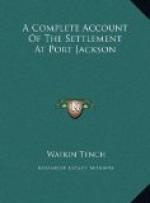The convicts continue to behave pretty well; three only have been hanged since the arrival of the last fleet, in the latter end of June, all of whom were newcomers. The number of convicts here diminishes every day; our principal efforts being wisely made at Rose Hill, where the land is unquestionably better than about this place. Except building, sawing and brickmaking, nothing of consequence is now carried on here. The account which I received a few days ago from the brickmakers of their labours, was as follows. Wheeler (one of the master brick-makers) with two tile stools and one brick stool, was tasked to make and burn ready for use 30000 tiles and bricks per month. He had twenty-one hands to assist him, who performed every thing; cut wood, dug clay, etc. This continued (during the days of distress excepted, when they did what they could) until June last. From June, with one brick and two tile stools he has been tasked to make 40000 bricks and tiles monthly (as many of each sort as may be), having twenty-two men and two boys to assist him, on the same terms of procuring materials as before. They fetch the clay of which tiles are made, two hundred yards; that for bricks is close at hand. He says that the bricks are such as would be called in England, moderately good, and he judges they would have fetched about 24 shillings per thousand at Kingston-upon-Thames (where he resided) in the year 1784. Their greatest fault is being too brittle. The tiles he thinks not so good as those made about London. The stuff has a rotten quality, and besides wants the advantage of being ground, in lieu of which they tread it.
King (another master bricklayer) last year, with the assistance of sixteen men and two boys, made 11,000 bricks weekly, with two stools. During short allowance did what he could. Resumed his old task when put again on full allowance and had his number of assistants augmented to twenty men and two boys, on account of the increased distance of carrying wood for the kilns. He worked at Hammersmith, for Mr. Scot, of that place. He thinks the bricks made here as good as those made near London, and says that in the year 1784, they would have sold for a guinea per thousand and to have picked the kiln at thirty shillings.’
Such is my Sydney detail dated the 12th of November, 1790. Four days after I went to Rose Hill, and wrote there the subjoined remarks.
November 16th. Got to Rose Hill in the evening. Next morning walked round the whole of the cleared and cultivated land, with the Rev. Mr. Johnson, who is the best farmer in the country. Edward Dod, one of the governor’s household, who conducts everything here in the agricultural line, accompanied us part of the way, and afforded all the information he could. He estimates the quantity of cleared and cultivated land at 200 acres. Of these fifty-five are in wheat, barley, and a little oats, thirty in maize, and the remainder is either just cleared of




